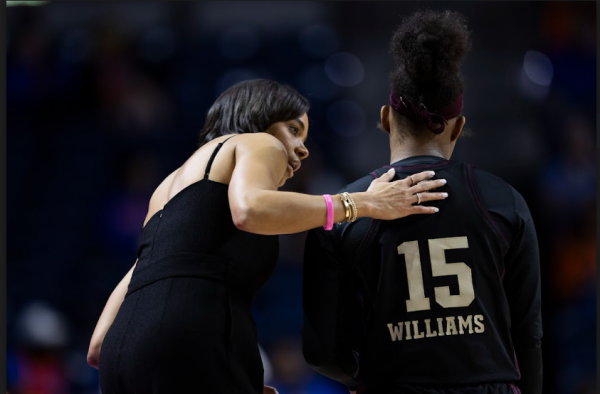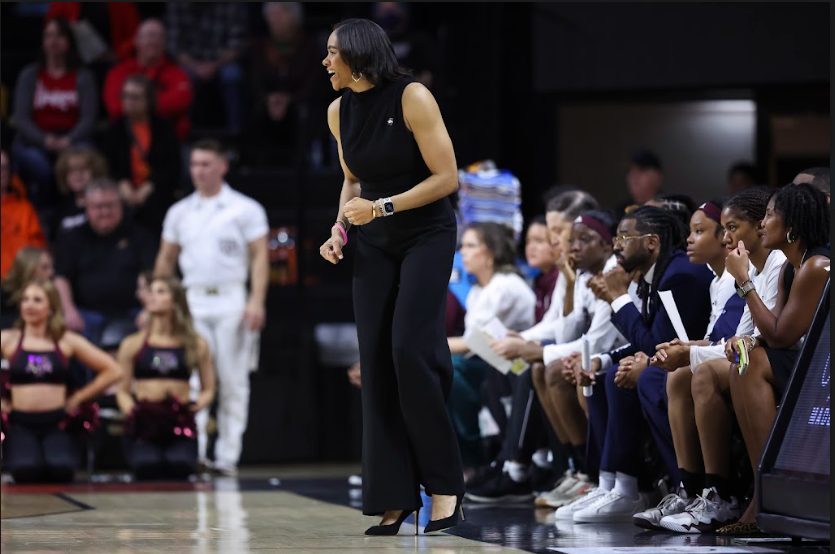Texas A&M womens basketball head coach Joni Taylor cheers on her team at one of their games. Taylor noticed a discrepancy between women and safe spaces, and vowed to create places where her female athletes and colleagues could feel welcome.“(Women) do so much for so many. We’re mothers, we’re wives, we’re daughters, we’re CEOs, we’re stay at home moms, we’re professors, we’re retired people in the community. We do so much, and who is pouring back into us? Where is there a space that we come, we connect, we recharge our batteries?” Taylor said. Photo by Ethan Mito
Joni Taylor, award-winning Texas A&M head girls basketball coach and former University of Georgia head girls basketball coach, talks about her career, coaching legacy and experience at the 2024 Paris Olympics.
Sports Staffer Jovi Grantham: Your connection to Athens is based on when you were coaching at University of Georgia from 2012 to 2022. Given your success in Athens, what prompted your transition to Texas A&M?
Texas A&M head womens basketball coach Joni Taylor: (Coaching at UGA was) great experience, (I) had a great success (and am) really proud of what we did there, and in 2022, we asked to make the change initiative to go to Texas A&M. I’m really grateful for the time I had there and the people who believed in us and supported us. I knew that a shift in college athletics was coming when you look at the viewership and the revenue, how it’s changed over the last three or four years. I knew there was going to be a huge surge, and it was just important wherever we (the basketball team Taylor was coaching) were, that we were at an institution that was going to support women’s basketball at the highest level.
JG: Could you explain what the preparation and traveling was like for the 2024 Paris Olympic Games?
JT: It’s not as much prep as people think, because those athletes are playing in their Women’s National Basketball Association season. What just jumps out anytime I serve with USA Basketball is how professional those young women are in terms of being able to compartmentalize for the 23 to 24 days that we’re together and understand what it is we’re all there for. Most of them take on a role that’s much different than the role they’re on on their WNBA team. Very few of them can be their authentic selves. They understand how important it is to represent our country, and the mission to bring home a gold medal. At the end of the day, when we win, and we’re standing there, and we hear the national anthem being played, we see the flag being raised into the stands. The amount of pride that I have every single time, it just always shocks me.
“I’m proud of seeing players come in as freshmen with just so much to learn, so much to grasp, so much to figure out, and in some cases, lost. I’m proud of the fact that four years later, we’ve pointed them in (the) right direction to help them achieve their goals.”
— Joni Taylor,
Texas A&M head womens basketball coach
JG: How do the Olympic players work together? How are they communicating with each other and building a relationship so they can move forward and get these medals?
JT: Most of them have participated in USA Basketball at some point. So, they understand the importance of getting rid of whatever their personal ego is in order to fall under the umbrella of USA Basketball. The commonality is them being able to understand what the goal is. (It’s) so important because there is a very short window of time to practice and to create the bond and the chemistry that most teams get to have and to practice with.
JG: What would you say are the team strengths? What are your strengths as a coach?
JT: Our talent, number one is strength, and their ability to compartmentalize and handle the pressure that comes with being on the Olympic team. I think their strength is being able to take on a different role than the role that they are WNBA teams, and being willing to make that sacrifice to do what’s best for the overall team. For me, I’ve had a lot of experience with USA Basketball. The familiarity I had with some of those foreign players proved to be pivotal. My strength was supporting (them) any way that I could.
JG: How would you say your Olympic and college players would describe your work ethic?
JT: They would say that I’m a workaholic. That I am competitive. I’m going to go above and beyond to make sure that what is turned in, or what’s presented, or what’s being done, every detail has been met, I’s dotted, T’s crossed. That’s just kind of the level of detail that I have.
JG: Given that you’re a workaholic, what’s your philosophy towards winning?

Texas A&M women’s basketball head coach Joni Taylor talks to one of her players at a game. Taylor has not pressured her players to only focus on winning because she wanted to teach them to leave everything on the court and abandon their egos. “There’s some years that winning may not be the primary thing. As we are building our foundation, how do we define success when it doesn’t come into win,” Taylor said. Photo by Ethan Mito
JT: Winning is something that is really important in terms of what it is we do, but I never want our players to put their value in winning and to put their self-worth into winning. We talk about what success looks like when it doesn’t come in a win. Basketball is what we do. It is not who we are.
JG: You’ve attained two head coaching positions at D1 schools as well as coached the Olympic team. What are your further goals to accomplish in the next few years?
JT: To be where my feet are in the space that I’m in at Texas A&M. I want to run multiple championships there, starting with SEC championships, and national championships. That’s what our focus is, and to see our players graduate and achieve the dreams and goals that they have for themselves. That’s what we are charged to help them do.
JG: Of all the things that you’ve accomplished, what would you say that you’re most proud of?
JT: I’m proud of seeing players come in as freshmen with just so much to learn, so much to grasp, so much to figure out, and in some cases, lost. I’m proud of the fact that four years later, we’ve pointed them in (the) right direction to help them achieve their goals. I love recruiting. I love X’s and O’s. I love everything about basketball, but I know that basketball is the vessel, is the way in for me to help shape lives and change lives in a positive manner, and that’s what I’m most proud of.
